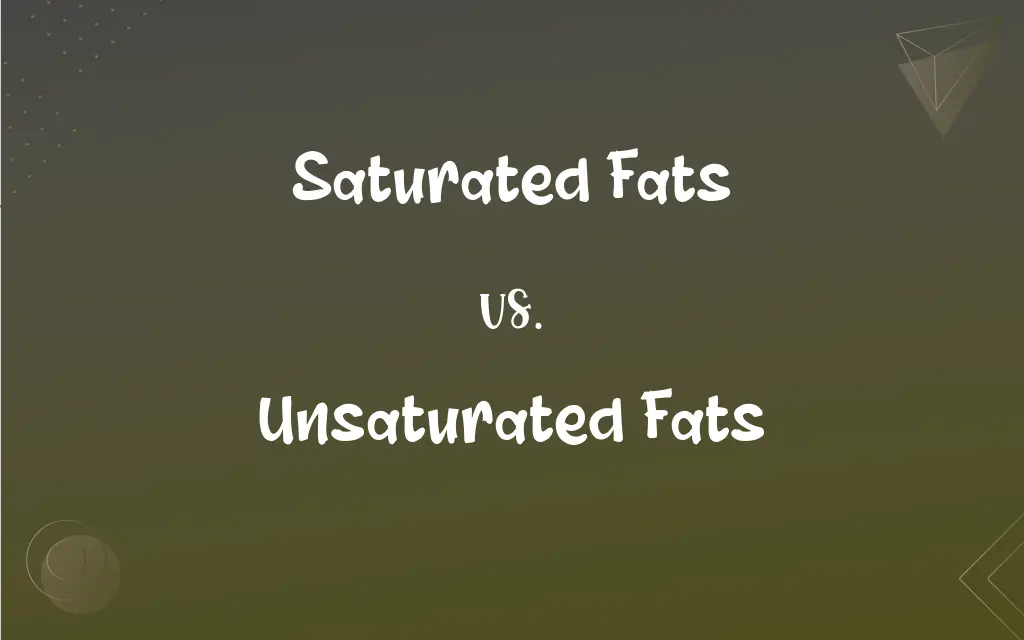Saturated Fats vs. Unsaturated Fats: What's the Difference?
Edited by Janet White || By Harlon Moss || Updated on October 8, 2023
Saturated fats have no double bonds between carbon atoms, while unsaturated fats have one or more. Both are dietary fats but vary in physical properties and health impacts.

Key Differences
In the realm of nutritional science, saturated fats and unsaturated fats hold distinct identities despite their shared role in dietary practices. Saturated fats are renowned, or perhaps more appropriately notorious, for being generally solid at room temperature, attributing this physical property to their lack of double bonds between carbon atoms. On the other hand, unsaturated fats generally exhibit a liquid state at room temperature, attributing this to one or more double bonds in their fatty acid chains, which prevent the molecules from packing closely together. Thus, their molecular structures fundamentally differentiate saturated fats and unsaturated fats.
When contemplating the health implications of saturated fats and unsaturated fats, a remarkable divergence comes to light. Consuming saturated fats, often found in animal products and some tropical oils, has been associated with elevated cholesterol levels, subsequently drawing links to heart disease and stroke. Unsaturated fats, found abundantly in plant-derived oils, nuts, seeds, and fish, are often celebrated for their capacity to reduce LDL cholesterol levels when used as a replacement for saturated fats, heralding a more heart-healthy reputation. This distinction in health impact establishes a critical differential between the two fat types.
In culinary applications, saturated fats and unsaturated fats bring varied textures, flavors, and stability to dishes. Saturated fats, such as butter and coconut oil, offer a rich and stable medium, often providing firmness to dishes, especially in baking, where they contribute to the desired texture and mouthfeel. In contrast, unsaturated fats, such as olive oil, are noted for their ability to impart a distinct but not overpowering flavor and are usually employed in dressings, sautés, and frying, where their fluidity is desired. The choice between saturated and unsaturated fats in cooking is influenced by both their physical properties and flavor profiles.
Sociocultural and ethical dialogues around saturated fats and unsaturated fats also yield intriguing conversations. Saturated fats, often derived from animal sources like meat and dairy, can be entwined with discussions on animal ethics and environmental considerations. Unsaturated fats, though predominantly derived from plant sources, are not exempt from scrutiny, with conversations on sustainable production (e.g., palm oil) and potential allergens (e.g., nut oils) guiding discourse. Both fats, despite their inherent differences, navigate the intertwined pathways of dietary choice, ethics, and sustainability.
Comparison Chart
Molecular Structure
No double bonds between carbon atoms
One or more double bonds between carbon atoms
ADVERTISEMENT
Physical State at Room Temp
Generally solid
Generally liquid
Health Impact
Often linked to increased cholesterol
Typically considered heart-healthy
Common Sources
Animal products, coconut oil
Plant oils, nuts, seeds, fish
Use in Cooking
Baking, solidifying dishes
Dressings, frying, maintaining fluidity in dishes
Saturated Fats and Unsaturated Fats Definitions
Saturated Fats
Saturated fats, often found in animal products, are typically solid or semi-solid at room temperature.
The cheeseburger contains a high level of saturated fats, notably from the cheese and beef patty.
ADVERTISEMENT
Unsaturated Fats
Unsaturated fats contain one or more double bonds between carbon atoms in their fatty acid chains.
Olive oil, rich in unsaturated fats, remains liquid at room temperature, providing a smooth texture to dressings.
Saturated Fats
Saturated fats are frequently utilized in cooking and baking due to their stability and ability to solidify.
Pastry chefs often prefer using saturated fats to achieve a flaky, crisp texture in pie crusts.
Unsaturated Fats
Unsaturated fats are typically liquid at room temperature and found in plant-based oils and fish.
The avocado, high in unsaturated fats, is often touted for its heart-healthy properties.
Saturated Fats
Saturated fats are fats containing fatty acid chains with all single bonds between carbon atoms.
Butter, rich in saturated fats, solidifies at room temperature, providing a distinct texture in baked goods.
Unsaturated Fats
Unsaturated fats can contribute to lowering LDL cholesterol levels when replacing saturated fats in the diet.
Diets high in unsaturated fats, like those prevalent in Mediterranean cuisine, have been linked to cardiovascular benefits.
Saturated Fats
Saturated fats are omnipresent in various foods, including dairy, meat, and some plant-derived oils.
Coconut oil, despite being plant-based, is a notable source of saturated fats, offering a solid consistency and mild flavor.
Unsaturated Fats
Unsaturated fats are categorized into monounsaturated and polyunsaturated fats, based on their number of double bonds.
Walnuts, which contain a good amount of polyunsaturated fats, are considered a nutritious snack.
Saturated Fats
Saturated fats can raise LDL cholesterol levels in the blood, potentially increasing the risk of heart disease.
Research indicates that diets high in saturated fats can be correlated with elevated cholesterol levels.
Unsaturated Fats
Unsaturated fats are often utilized in culinary applications for their flavor and ability to remain liquid.
Chefs use unsaturated fats like canola oil for frying due to its high smoke point and neutral flavor.
FAQs
Are saturated fats unhealthy?
While not inherently unhealthy, excessive saturated fats can raise LDL cholesterol and increase heart disease risk.
Where are saturated fats commonly found?
In animal products like meat and dairy, and some plant oils like coconut oil.
Why use unsaturated fats in cooking?
They often provide fluidity, distinct flavors, and can withstand high cooking temperatures.
Can unsaturated fats be healthy?
Yes, unsaturated fats can lower LDL cholesterol and are often considered heart-healthy when consumed in moderation.
What's the role of saturated fats in cooking?
They provide texture, flavor, and stability, often solidifying dishes.
Can saturated fats be converted to unsaturated fats?
Not naturally in foods; however, industrial processes can hydrogenate unsaturated fats, altering their structure.
What are unsaturated fats?
Unsaturated fats have one or more double bonds between carbon atoms and are usually liquid at room temperature.
Where can I find unsaturated fats?
Predominantly in plant oils, nuts, seeds, and fish.
Can unsaturated fats impact cholesterol levels?
Yes, they can lower LDL cholesterol levels and are associated with heart health.
Should I consume unsaturated fats daily?
While beneficial, it’s essential to consume unsaturated fats in moderation as part of a balanced diet.
How do saturated fats differ structurally from unsaturated fats?
Saturated fats lack double bonds between carbon atoms, while unsaturated fats have at least one.
Can unsaturated fats be found in animal products?
Yes, certain fish, for example, are rich in unsaturated fats.
What are trans fats?
Trans fats are unsaturated fats that have been industrially modified, often through hydrogenation, to be solid at room temperature.
How do saturated fats affect cholesterol?
They can raise LDL cholesterol levels, potentially increasing heart disease risk.
Is it necessary to eliminate all saturated fats from the diet?
No, moderation is key; they can be part of a balanced diet but should be limited.
Are all saturated fats animal-derived?
No, some plant oils, like coconut oil, are also high in saturated fats.
Can I replace saturated fats with unsaturated fats in recipes?
Often, yes, but it may alter the texture and flavor of the dish.
What are saturated fats?
Saturated fats are fats with no double bonds between carbon atoms and are typically solid at room temperature.
Do unsaturated fats always stay liquid?
Generally, yes, at room temperature, but they can solidify when chilled, depending on the type and source.
Are saturated fats always solid?
Generally solid or semi-solid at room temperature, but can be melted with heat.
About Author
Written by
Harlon MossHarlon is a seasoned quality moderator and accomplished content writer for Difference Wiki. An alumnus of the prestigious University of California, he earned his degree in Computer Science. Leveraging his academic background, Harlon brings a meticulous and informed perspective to his work, ensuring content accuracy and excellence.
Edited by
Janet WhiteJanet White has been an esteemed writer and blogger for Difference Wiki. Holding a Master's degree in Science and Medical Journalism from the prestigious Boston University, she has consistently demonstrated her expertise and passion for her field. When she's not immersed in her work, Janet relishes her time exercising, delving into a good book, and cherishing moments with friends and family.
































































